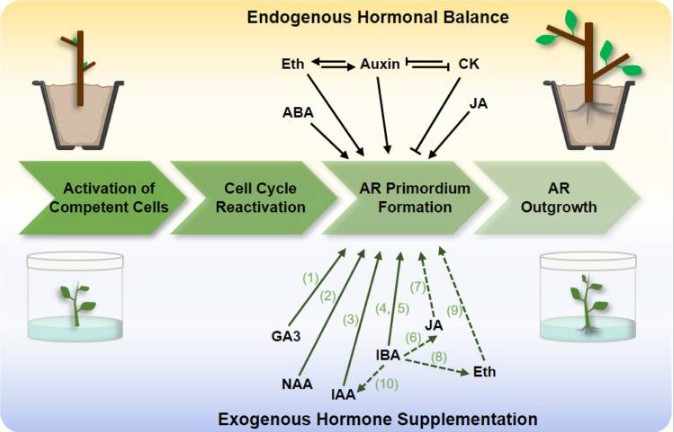Adventitious roots are a form of post-embryonic development in plants regulated at multiple levels. Many species can produce adventitious roots during normal development but also in response to environmental stresses such as injury, flooding, or nutrient deficiency. The ability to produce adventitious roots is an essential step in the vegetative propagation of economically important horticultural and woody species and, from an ecological perspective, provides a selective advantage to plants that reproduce this way. In woody species propagation, using cuttings is economically essential to amplify elite clones for plantations rapidly. Adventitious roots also play an essential ecological role since they contribute to the survival of plants exposed to biotic and abiotic stresses, as well as to the dynamics of plant populations, and they also enhance the efficiency of phytoextraction of contaminated soils. Moreover, a strong root system is essential for providing an adequate anchor, especially important in windbreaks. Therefore, understanding the mechanisms of adventitious root formation in woody species is important for the large-scale sexualization of economically and horticulturally important tree species. Reproduction is of great importance. However, in many tree species, recalcitrance in adventitious root formation is a significant limitation in clonal propagation of superior germplasm.
 Fig. 1. Hormones affecting adventitious root formation in clonal propagation by cuttings and tissue culture of a woody plant. (Zhao et al., 2022)
Fig. 1. Hormones affecting adventitious root formation in clonal propagation by cuttings and tissue culture of a woody plant. (Zhao et al., 2022)
Emergent adventitious root regeneration represents an elegant evolutionary innovation that allows many plant species to be propagated by asexual reproduction, and the propagation of superior genotypes is widely used in forestry and horticulture. However, some species of high economic and ecological value are difficult to root, and the genetic and molecular basis of adventitious root regeneration remains largely elusive. Based on many years of experience in plant tissue culture, Lifeasible offers comprehensive solutions to study adventitious root propagation in woody plants.
As with other traits, plant adventitious root formation is strongly genotypically influenced, with significant differences in rooting ability between genotypes. We can help you identify the genotypes involved in controlling adventitious rooting in woody species. In addition, our breeders can overcome poor rooting by breeding crosses between poplars that root well and genotypes with traits of interest that are difficult to root. We aim to help you understand the physiological and genetic mechanisms of adventitious root formation and accelerate woody plant breeding.
The genus Populus is among the most economically important woody plants. It has the advantages of a fast growth rate, good adaptation to marginal soils, multiple potential ends use, availability of genome sequences, smaller genome size, ease of propagation in tissue culture, and effective genetic transformation, etc. We provide the genus Populus as an experimental model to study adventitious root formation in tree species.
The adventitious root of the genus Populus is a complex trait. We offer specialized molecular genetics to help you identify the genomic regions that contain the genes that control it. We can detect quantitative trait loci for many adventitious root-related traits, such as total number of roots, total root length, mean root diameter, surface root area, and root volume.
We offer transcriptome analysis to identify candidate genes associated with adventitious roots in Populus. Transcriptomes from different individuals exhibiting good and poor rooting can be analyzed to identify differentially expressed genes located in regions associated with adventitious rooting from quantitative trait loci or genome-wide associations. Transcriptome analysis is an excellent complementary method for identifying genes involved in adventitious root formation in the genus Populus. We help you identify genes that can be used as markers to characterize the rooting ability of trees producing early clones.
We can help you analyze internal factors (parent plant condition, gibberellins, cytokinins, abscisic acid, brassinosteroids, strigolactones, γ-aminobutyric acid, and some polyamines) and external factors (microorganisms, soil mineral content, humidity and texture, light quality and intensity, soil, air temperatures, and pre-planting treatments) that influence adventitious root formation.
For woody perennials, stem cutting and tissue culture are the most used clonal propagation techniques. Lifeasible can select good adventitious rooted clones for breeding programs at an early stage of plant development. To overcome the difficulty of rooting, the basal part of cuttings can usually be treated with high concentrations of auxin for root production and then plant for cutting regeneration, or the stem segment explants are cultured in Murashige and Skoog (MS) medium supplemented with various concentrations of auxin or its analogs, such as indole acetic acid (IAA), IBA, and 1-naphthalene acetic acid (NAA). By knowing the optimal concentration of IBA or NAA to apply in the clonal propagation of a wide range of woody plants, we help you to increase rooting rates and achieve efficient in vitro propagation.
Lifeasible recognizes that each project has unique challenges and goals, providing tailored solutions to analyze the genetic and molecular basis of adventitious root regeneration. We aim to improve clonal propagation of superior forestry germplasm by promoting the ability of woody plants to form adventitious roots. Contact us today to learn more about our services.
Reference